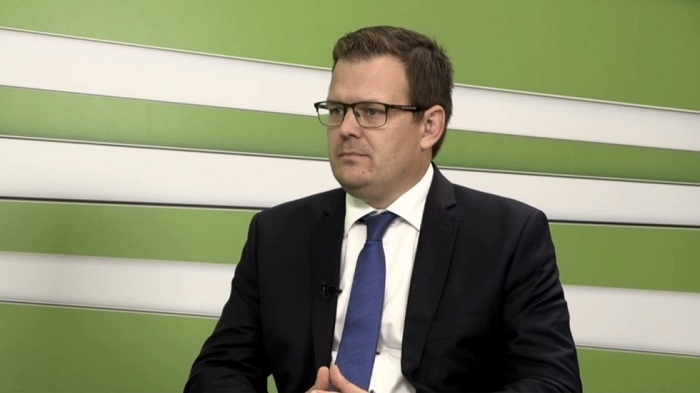GLENN DIESEN FOR GULAN: Russia is winning the war

Glenn Diesen earned a PhD from the Vrije Universiteit Amsterdam with a dissertation titled Inter-democratic security institutions and the security dilemma. He was formerly based in Russia and employed by the Moscow-based Higher School of Economics, and is now a professor at the University of South-Eastern Norway. In a written interview he answered our questions as the following:
GULAN: How do you anticipate the conflict between Russia and Ukraine to unfold? and why, in your opinion, is Russia stepping up its military endeavors?
Professor Dr. Glenn Diesen: Russia is winning the war, but I think many people fail to recognize this because they focus on territory as opposed to attrition rates. Going on the offensive results in higher levels of casualties, thus is it often advantageous to avoid offensives and retreat from the territory that will have high levels of casualties to defend. This is a war of attrition, in which the objective is to exhaust the military power of the adversary and preserve/build your own strength. Once the adversary has been severely weakened, then large swaths of territory can be captured without excessive losses. Over the past year, Ukraine has thrown its soldiers and military equipment at Russia’s well-fortified defensive lines and thus suffered immense losses. Ukraine has now exhausted its manpower, burnt through large parts of its military equipment, and even NATO reports that its weapon storages are dangerously low and political support for the proxy war is dwindling. At the same time, Russia mobilised hundreds of thousands of troops in the rear, dramatically increased its production of military equipment in preparation to go on the offensive once Ukraine had exhausted itself. Today Russia has a much larger army, it dominates in artillery, air force, missiles, drones, air defences, electronic warfare and every other objective measurements. It appears the war has reached the stage of the war in which Russia launches a major offensive to start taking strategic territory.
GULAN: How effective do you believe the sanctions imposed by the West are, given that Russia has plainly not run out of money?
Professor Dr. Glenn Diesen: The sanctions were destined to fail, however, I was surprised by the extent of their failure. Sanctions worked better in the 1990s when there was only one centre of power in the world. Today, the world is multipolar and Russia has more opportunities to diversity its economic connectivity. Russia has not merely attempted to get by under sanctions but to permanently shed its dependence on the Western economies and instead integrate its economy with the non-Western world. This diversification has been successful as Russia’s economy is growing while Europe is struggling as it has failed to diversify away from its dependence on Russia.
GULAN: What would you say about the UN's inept role in the conflict between Russia and Ukraine?
Professor Dr. Glenn Diesen: The UN can only perform its duties to the extent its leading member states enable it to perform, as it is an international institution, not a supranational institution. The objective has not been peaceful coexistence with Russia in Europe, but to permanently weaken and marginalise Russia in Europe. I think there was never a serious effort to pursue a mutually acceptable peace, instead NATO countries sought to use Ukraine to achieve a strategic victory over Russia. The US and UK openly sabotaged the Minsk peace agreement since 2015 and even Germany and France have admitted the peace agreement was never intended to be implemented but to buy time to arm the Ukrainian army. Similarly, when Russia eventually invaded in February 2022, the US and the UK again sabotaged the pending peace agreement between Ukraine and Russia that could have stopped the war in the first weeks. Both NATO and the EU stated that the war would instead be resolved on the battlefield, and none of their leaders have wanted any diplomacy or negotiations with Russia. The UN therefore never had a chance to prevent or to stop this war.
GULAN: Do you believe that this inefficiency has made the world less secure? And it's time for a reform and restructure of this organization?
Professor Dr. Glenn Diesen: It is important that the permanent membership of the UN Security Council reflects the actual international distribution of power. The five permanent members were the great powers and victors of the Second World War, and the realities have since changed greatly. If India and Brazil would become permanent members of the UN Security Council it would function better.
GULAN: Do you believe that this war will continue and perhaps result in a nuclear war, or do you believe that this is unlikely?
Professor Dr. Glenn Diesen: Nuclear war is a real possibility, and I can see two possible scenarios. First, if Russia faced defeat. In NATO we attempt to defeat Russia, but we never defined what defeating the world’s largest nuclear power would look like. Russia considers NATO’s incursion into Ukraine to be an existential threat, and Russia would use nuclear weapons long before NATO would reach Crimea. By comparison, the US would use nuclear weapons instead of allowing the Russian or Chinese army to entrench themselves in Mexico. The second scenario for nuclear war is if NATO enters the war directly. It appears that Ukraine is heading for collapse, at which point NATO is faced with a dilemma: does the military alliance accept the war is lost or does it dramatically escalate by entering the war as a direct participant? If the proxy war escalates to a direct NATO-Russia war, then it will be very difficult to avoid a nuclear war.
GULAN: Do you think the current global order should be reconstructed using completely different values and principles? If yes, what key components would that new order include?
Professor Dr. Glenn Diesen: Yes, a stable world order capable of ensuring peace must reflect the current realities. The world order was revised after the Cold War and became defined as liberal hegemony as there would only be one centre of power, and the collective West claimed the prerogative to interfere in the domestic affairs of other states and even use military force to advance and defence liberal democratic values. Today, the world is multipolar and the majority of the world rejects an international system based on sovereign inequality in which the West can exempt itself from international law under the guise of adhering to the so-called “rules-based international order”. We need a word order that can accommodate the multipolar realities that are already here, and return to international law in which the same rules applies to all. The most important principle of a renewed Westphalian system is indivisible security, as one state should not increase its security at the expense of others. Case in point, the US would never accept a China-Russia military alliance in Central America as this would undermine US security, and the US must then accept it cannot build military alliances on the borders of its adversaries. This should not be controversial and adhering to the principle of indivisible security would benefit the entire world.
GULAN: Do you think the Gaza War has any bearing on Russia and Ukraine, or is it irrelevant?
Professor Dr. Glenn Diesen: It has had a significance influence on the war. The US has limited resources, and it cannot sufficiently finance and provide weapons for both Ukraine and Israel while at the same time preparing for war against China. The political and military support for Ukraine was already falling before the war in Israel/Palestine, but the start of this war intensified the collapse of support. This also has some advantages for the US as it makes a defeat in Ukraine more feasible. A key concern for Washington is the reputational damage whenever it is losing a war. Usually, the best solution is to merely stop talking about it as was done after the defeat in Afghanistan. Thus, the war in Israel/Palestine enables the US to shift focus away from its previous war.















